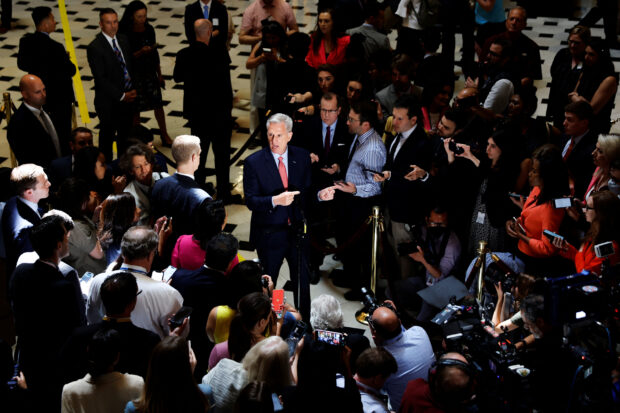Republicans, White House see progress in US debt ceiling talks

U.S. House Speaker Kevin McCarthy (R-CA) speaks with reporters at the U.S. Capitol in Washington, U.S. May 24, 2023. REUTERS/Jonathan Ernst
WASHINGTON -Negotiators for Democratic President Joe Biden and top congressional Republican Kevin McCarthy held what both sides called productive talks on Wednesday to try to reach a deal to raise the United States’ $31.4-trillion debt ceiling and avoid a catastrophic default.
After a four-hour White House meeting, U.S. House Speaker McCarthy said negotiations had improved and would continue in the evening. He predicted the two sides would reach an agreement, though several issues remain unresolved.
“We’ve made some progress working down there. So that’s very positive,” McCarthy told reporters. “I want to make sure we get the right agreement. I can see that we’re working towards that.”
White House spokesperson Karine Jean-Pierre said talks remain fruitful.
“If it keeps going in good faith, we can get to an agreement here,” she said at a briefing while discussions were taking place.
Article continues after this advertisementBut the White House and congressional Democrats also accused Republicans of taking the economy hostage to advance an agenda they could otherwise not pass. They said Republicans need to make more concessions as they will need Democratic votes to pass any deal.
Article continues after this advertisement“Just listen to members of The House Freedom Caucus… now openly referring to the full faith and credit of the United States as a hostage,” Jean-Pierre, the White House spokesperson, said.
Ratings agency have taken note of the impasse with McCarthy insisting on spending cuts while Biden wants to hold spending steady.
Fitch put the United States’ “AAA” ratings on negative watch on Wednesday. The agency said it believes “risks have risen” that the debt ceiling will not be raised before the so-called X-date, when the Treasury runs out of money, adding that “increased political partisanship… is hindering reaching a resolution.”
https://business.inquirer.net/402559/fitch-puts-us-on-negative-credit-watch
Moody’s, another rating agency, might change its assessment of U.S. debt if lawmakers indicate a default is expected. Moody’s currently has a top-notch “AAA” rating for U.S. debt, while rival rating agency S&P Global lowered its rating following a 2011 debt-ceiling showdown. A lower rating could push up borrowing costs.
Time is running short, as the Treasury Department has warned the federal government could be unable to pay all its bills by as soon as June 1 – just eight days away – and it will take several days to pass legislation through the narrowly divided Congress.
https://business.inquirer.net/402037/yellen-says-june-1-is-hard-deadline-for-raising-debt-ceiling
House Republican leaders said they would adjourn on Thursday for a week-long Memorial Day holiday recess scheduled but would call lawmakers back if needed for any votes, Punchbowl News reported.
McCarthy has insisted that any deal must not raise taxes and must cut discretionary spending, not hold it steady as Biden has proposed.
Any deal that Biden and McCarthy reach will have a narrow path for passage through the divided Congress, where McCarthy’s Republicans hold a 222-213 House majority and Biden’s Democrats control the Senate by a 51-49 margin.
The lack of progress has heightened concerns that Congress could inadvertently trigger a crisis by failing to act in time.
“We’re certainly getting to a place that’s too close for comfort,” said Shai Akabas of the Bipartisan Policy Center, a think tank.
Stocks slide
The months-long standoff has spooked Wall Street, weighing on U.S. stocks and pushing the nation’s cost of borrowing higher.
U.S. stock indexes fell on Wednesday on debt-ceiling concerns.
“Up until yesterday, investors have been very optimistic,” said Angelo Kourkafas, senior investment strategist at Edward Jones. “But now as we get closer … we are seeing some caution again.”
Treasury Secretary Janet Yellen on Wednesday said the United States will be unable to pay all its bills by early June but said she did not know exactly what day the government will run out of resources.
That would trigger a Wall Street meltdown and push the U.S. economy toward recession, with the default also hitting regular Americans, economists say. Medical providers that rely on government payments could be among the first to feel the heat.
Republicans want to cut discretionary spending for the 2024 fiscal year beginning in October by roughly 8 percent, while Democrats have pushed to hold it steady at this year’s rate.
Negotiators differ over Republicans’ proposals to impose new work requirements on benefits programs for low-income Americans and loosen energy permitting rules.
The White House has offered to limit discretionary spending for the coming two years, in line with previous bipartisan budget agreements. Republicans have offered spending caps for the coming six years.
Republicans have rejected White House proposals to set a minimum tax on corporations and billionaires and broaden the government’s ability to negotiate lower prices for prescription drugs, according to Democratic Representative Pramila Jayapal, who leads the 101-member Congressional Progressive Caucus.
Congress regularly needs to raise the nation’s self-imposed debt limit to cover the cost of spending and tax cuts it has already approved.
Each party faces opposition to the talks from within, with hardline Republicans insisting on the sharp spending cuts they passed in a House bill last month and progressive Democrats opposed to spending cuts or new work requirements.
Biden spent months saying he would not negotiate on raising the debt limit only to reverse course and begin talks with McCarthy in the last few weeks.